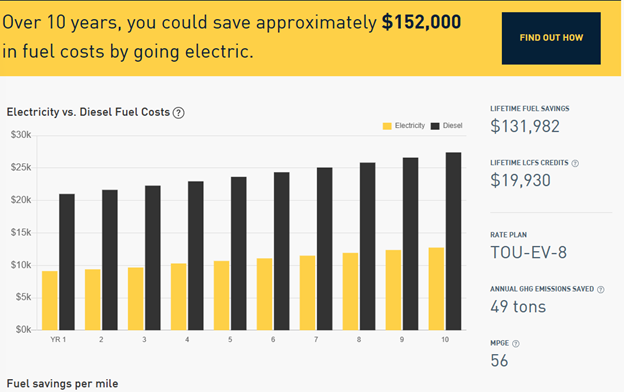Electrification is catching on in the hauler industry. Republic Services is going all-in on fully integrated electric recycling and garbage trucks. With a fleet of over 17,000 vehicles nationwide, this sustainability initiative puts Republic in the vanguard of leaders in their industry.
Republic is one of the largest operators offering residential and commercial recycling and waste solutions. Electrification of heavy-duty waste management vehicles requires commitment like that shown by one of the largest waste disposal companies and environmental services leaders, Republic Services. Over the next five years, Republic’s electric garbage trucks will represent half the new trucks purchased. As more urban diesel bans and zero-emission zones are announced, this will also help drive adoption rates.
In the United States, national regulations will require up to a 25 percent reduction in carbon dioxide emissions by 2027. The Biden Administration is advancing the electric vehicle charging infrastructure by supporting a nationwide charging network and funding opportunities for technology and business model innovation. In recent months, Biden’s administration embraced a bipartisan Senate deal to spend $1.2 trillion on infrastructure projects, including $7.5 billion on EV infrastructure, including charging stations.
Production is picking up in the hauler industry
More production will increase opportunities for this industry to embrace innovations. According to the Journal for Municipal Solid Waste Professionals,“Mack, BYD, Lion Electric, Daimler, Peterbilt DAF, and Nikola all have prototypes or early production models of electric garbage trucks in the pipeline.” (5/19/21)
Cities are also making investments in all-electric
In addition to Republic Services’ move toward a clean energy transition, large cities are making investments too. According to MSW Management,
– In early 2020, the City of Los Angeles committed to a 100% electric sanitation fleet by 2035 and pledged to procure only electric trucks starting in 2022.
-New York City began testing the first full-sized electric Mack LR garbage truck in 2020 and plans to put 2,000 electric vehicles into service by 2025. NYC Buying 7 Electric Garbage Trucks – CleanTechnica
– All across the United States, from Miami-Dade County to Chicago, to Seattle, electric trucks are making their way into garbage collection fleets.
Stop-start nature of garbage trucks is perfect for EVs
The nature of door-to-door service involves stopping and starting hundreds of times per shift; that is hard on the engines. The Mack LR Electric makes use of what otherwise would be wasted energy through its three-stage regenerative braking system. Consider this: garbage trucks make hundreds of stops on their routes. Regenerative braking helps to recharge the battery. Electric Garbage Trucks Are Finally Coming in 2021 With the Battery-Powered Mack LR (thedrive.com)
Community and workforce health benefits
Going electric has implications for workforce and community health too. Imagine just how QUIET these trucks will be compared to the ones currently serving most communities. Garbage trucks produce around 85 decibels of noise, which is louder than a jackhammer or a gas-powered lawn mower. Noise above 85 decibels can be harmful.
Offsetting costs of acquisition
Transportation is a dominant cost for small nonprofit haulers and large waste and recycling corporations alike and that’s not going away. EV truck upfront costs are 30 to 50 percent more expensive than diesel-powered trucks.
The average garbage truck lasts 10-15 years. Switching to electric or hybrid systems can be part of vehicle replacement plans. The cost of acquisition can be offset by the savings from using electricity compared to the cost of gas or diesel.
These trucks are a financial commitment. “Buying a new electric garbage truck will cost more than $315,000 after a grant, and another $28,000 for charging equipment. On average, a diesel garbage truck will cost about $183,000.” (Pretty Motors, 07/17/2022) Some federal subsidies can help bridge the gap in cost – in some cases by more than two-thirds. (https://lnkd.in/eHa6_8xe)
EV truck maintenance may be cheaper. The City of Ocala, Florida estimates that reduced maintenance costs for their five BYD electric refuse trucks will result in a 75% savings versus conventional.
There’s even an Electric Fleet Fuel Savings Calculator that compares the fueling costs of diesel to electric based on electric vehicle rates.

 SCE Fleet Fuel Calculator – Significant savings can be realized by going to electricity over expensive diesel and gas
SCE Fleet Fuel Calculator – Significant savings can be realized by going to electricity over expensive diesel and gas
Acquisition costs could delay this clean energy transition. According to Cornell’s College of Business, two other barriers exist: 1) Electrification readiness with supplemental infrastructure and ample charging stations and 2) Incentives and regulations that make purchasing electric vehicles more accessible.
Take the long view and expect a phased approach
This transition isn’t just a simple equation of buying electric fleets and installing charging stations.
MSW Waste Management points out, “Owners converting to electric fleets should expect the process to happen in phases. A phased approach has the advantage of giving technology time to advance and perhaps solve some of the problems that make the more complex routes more difficult.”
Many factors must be considered over the long term in the conversion to electric fleets:
- Utility collaboration: Get the local utilities involved early on;
- Route feasibility: Expect to adjust routes, schedules, and en-route charging strategies;
- Total cost of ownership : Consider the total return on investment knowing that ongoing operations costs are generally lower with electric vehicles;
- Sustainability: Consider the triple-bottom-line benefits over a longer timeframe in addition to calculations for the short-term cost of acquisition;
- Grant funding: Seek out grant funds for planning, siting, equipment purchases, electrical upgrades, installation, operations, and maintenance.
A combination of innovation, regulations, incentives, and cost-benefits plus the negative attention emissions, noise, and inefficiencies will change this industry and drive a decarbonization transition.